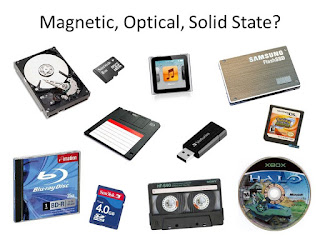secondary storage devices
Secondary storage is
where data software can be stored on a permanent basis. The data on secondary
memory stays there until it is deleted or overwritten by the user. There are
three types of secondary storage devices. They are:
1. Magnetic,
2. Optical and
3. Solid-state storage.
The most commonly
used magnetic storage device is hard drive. Data is stored in a hard drive in a
number of platters each containing circular tracks of magnetic spots. Each spot
can be magnetized or demagnetized logic one or zero. Storage capacities of hard
drives vary from 60 GB-2 TB.
Hard-Disk
Hard-Drive
SSD Solid State Device
Optical Storage Device
Another popular magnetic storage medium is
magnetic tape where data is stored in parallel tracks of magnetic sensitive
spots which can be magnetized of left demagnetized representing 1 or 0.
The next type of
storage device is the optical storage device. Rather than using magnetic media,
optical storage uses microscopic light spots to represent the logic bit 1 and
dark spots to represent the logic bit 0. Light and dark spots are often regions
that can reflect light to optical sensors and regions that cannot reflect light
to the optical sensors.
Optical storage devices are single platter, 4.7 inches in
diameter, and 0.05-inch thickness. There are primarily three types of optical
storage devices, CD (compact disk), DVD (digital video disk), and BD (blue-ray
disk). CDs can hold about 700 MB of data DVD can hold about 4.7 GB of data and Blue-ray disk can have 5 times the storage of DVD.
Solid
state storage devices are becoming more and more popular and they are replacing
disk drives (both magnetic and optic). They require less energy and quieter.
They are flash memory devices for data storage. A bit 1 is represented by a
transistor that accepts electric current and a bit 0 is represented by a transistor
that does not accept currents. Some examples of solid-state devices are pen
drive, SD card etc. They can store data from few gigabytes to up to 128 GB.


thanks for sharing.Passive Networking
ReplyDeleteStructured Cabling
I Like to add one more important thing here, Magnetic and Optical Media Manufacturing Markets at a compound annual growth rate (CAGR) 11.86% from 2019-2025 to reach a value of nearly US$ 15.80 Billion by 2025 end.
ReplyDeleteI recently came into your website and have been quite enjoying it. I decided I'd start with a comment. I'm not sure what more to say except that I enjoy reading. This is a fantastic website. This is a blog that I will read on a regular basis.
ReplyDelete